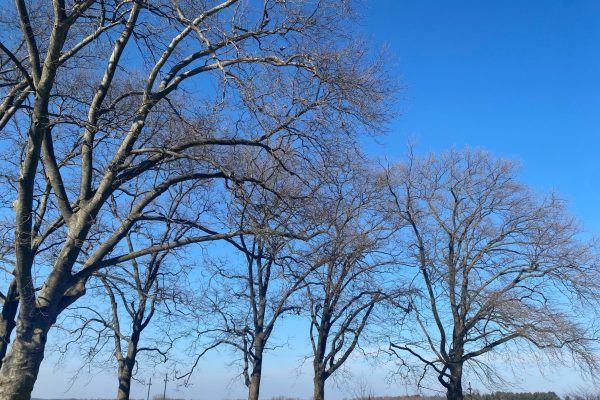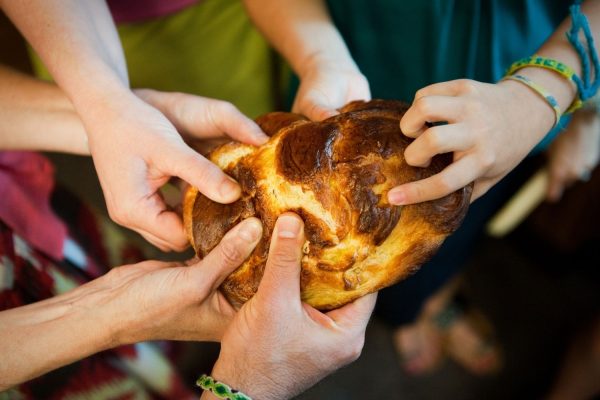Use this resource to prepare before the waterside Tashlikh ritual–ideally immediately before Tashlikh but it can also be used as a text study in the weeks leading up to Rosh Hashanah. Originally created for Tashlikh 5778 at B’nai Jeshurun of NYC.
Introduction
Shana Tova, and welcome to #### SYNAGOGUE Tashlikh! These materials have been prepared to enable us to spend time reflecting in pairs/small groups or independently.
This handout will be your guide before we gather at TASHLIKH SITE. Feel free to use it as a single session, or create a set of stops along the river walk.
As you move through the guide, you will notice that the stops themselves are focused on how various texts offer differing perspectives on how the encounter with water during tashlikh enhances, deepens or nuances our experience of teshuva. In between stops, there is space for more personal and individual reflection on how these perspectives relate to our own personal teshuva journeys.
Please feel free to allow your conversation and reflection to follow their own course, and do not worry if you don’t make it through all of the material – this outline is simply a guide.
Locations for the 5 Stops:
Stop 1 is the initial community gathering taking place at LOCATION 1
Stops 2, 3 and 4 are up to you to decide geographically
Stop 5 IS THE MEETING POINT JUST BEFORE THE TASHLIKH SITE
Stop 1: LOCATION 1
|
Micah 7:18-19 |
מיכה ז:יח–יט |
|
18 Who is a God like You, that pardons iniquity, and passes over the transgression of the remnant of Your heritage? God does not retain anger forever, because God delights in mercy. 19 God will again have compassion upon us; God will subdue our iniquities; and you will cast all their sins into the depths of the sea. |
יח מִי אֵל כָּמוֹךָ, נֹשֵׂא עָוֹן וְעֹבֵר עַל פֶּשַׁע, לִשְׁאֵרִית, נַחֲלָתוֹ: לֹא הֶחֱזִיק לָעַד אַפּוֹ, כִּי חָפֵץ חֶסֶד הוּא יט יָשׁוּב יְרַחֲמֵנוּ, יִכְבֹּשׁ עֲוֹנֹתֵינוּ; וְתַשְׁלִיךְ בִּמְצֻלוֹת יָם, כָּל חַטֹּאותָם. |
This is the text most traditionally associated with tashlikh and is part of the waterfront liturgy. It captures an idea about water and tashlikh that we may already be familiar with: water as a container for a physical manifestation of our sins.
● In this text, how aspects of water are highlighted? What is water’s role?
Given this text’s perspective, how does water shape our repentance process?
From Stop 1 to Stop 2: Individual Reflection
While you walk from Stop 1 to Stop 2, think about the various associations you have with water. Do any particular memories, images, or places come up for you when you think of a waterfront? In these memories, what does water represent? What emotions does it conjure up?
When you arrive at your chosen Stop 2, share with your partner as much as you are comfortable. When you are ready, proceed to the text for Stop 2 on the following page.
Stop 2
Rabbi Moses Isserles, Torat HaOlah 3:56
“The natural order demands that water should cover the entire planet and it is only through the chesed (lovingkindness) of God that God allowed us to have portions of land on which to live. Therefore, we go to the water to see that idea first hand, and through that we coronate God as Ruler of the World and it causes us to repent. We don’t throw our iniquities into the water – they are figuratively thrown in the river when we are inspired to repent.”
This text acknowledges the threat that water represents if left unrestrained. We need God to limit the world’s waters for human life to succeed. Water, though life-giving, also has a capacity for destruction, as has been painfully evident over the last few weeks.
● Reflect upon a quality in yourself that has a similar capacity for both nourishment and destruction.
● How can you embrace the positive while restraining the negative?
Given this text’s perspective, how does water shape our repentance process?
From Stop 2 to Stop 3: Individual Reflection
The fear articulated above leads to gratitude for the patches of land that God created for humankind. Perhaps only this sense of awe and gratitude can bring about true repentance.
As you walk from Stop 2 to Stop 3, think of an example of someone in your life that you have wronged, or a particular shortcoming you are striving to work on in yourself. How can applying a lens of gratitude reframe this teshuva? What about this relationship, or this trait, can you feel grateful for?
When you arrive at your chosen Stop 3, share with your partner as much as you are comfortable. When you are ready, proceed to the text for Stop 3 on the following page.
Stop 3
Rabbi MosesIsserles
“Throwing bread into the water and reciting the biblical passage mentioning “the deep” (Micah 7) is a reminder of the ‘deep’ out of which the days of creation were formed. Thus, by going to the sea on Rosh Hashanah, we celebrate creation and are led to think of our own place in God’s scheme of creation. When we contemplate these matters and repent from our sins, then they are truly thrown away, into the water, and we feel renewed on this Day of Judgement.”
Here, Rabbi Isserles offers a different idea: the water that we encounter during tashlikh bears connection to the water from the creation story. This connection is meant to evoke a sense of perspective and to remind us of our individual smallness in the scheme of creation.
● What is it about the reality of our own smallness that would lead to a desire to repent?
Given this text’s perspective, how does water shape our repentance process?
From Stop 3 to Stop 4: Individual Reflection
By reminding us of our place in creation, this text also reminds us of the ways in which we are all interconnected. Just like the way we treat (and, too often, pollute) water locally has a global impact, so too do our actions have ripple effects beyond their immediate consequences.
As you walk from Stop 3 to Stop 4, remember a time in which your actions had consequences that you did not anticipate (either for bad or for good!). How does this realization shape your commitments to action in the coming year?
When you arrive at your chosen Stop 4, share with your partner as much as you are comfortable. When you are ready, proceed to the text for Stop 4 on the following page.
Stop 4
Rashi, Commentary on Babylonian Talmud Masechet Shabbat P. 81
“The Geonim (rabbis from the 6th-11th centuries) used to plant a seed fourteen to twenty days before Rosh HaShanah. On Erev Rosh HaShanah, after it sprouted, they would wave it over their head and recite ”זה תחת זה” (“zeh tachat zeh” – “this in place of that”) and then throw it into the river.”
Rashi describes a bizarre custom that loosely parallels our current tashlikh practice. This medieval ritual seems to be a physical manifestation of the reminder that nothing is permanent – all of the fruits of our labor are ultimately ephemeral, and will be returned to nature.
● Why do you think this practice was specifically performed on Erev Rosh HaShanah? What aspects of the holiday connect to the ideas behind the practice?
● In this text, what is the role of the water – both literally, in relation to the plant, and metaphorically?
Given this text’s perspective, how does water shape our repentance process?
From Stop 4 to Stop 5
The practice in this text involved the rabbis physically letting go of something they were holding on to – something that they had cultivated and perhaps even grown to care about and love.
As you walk to Stop 5, think to yourself: what are you holding on to? Ask yourself if you need to let go of certain ‘sins,’ events, or habits from this past year.
We will gather together at Stop 5.
Stop 5: FINAL MEETING POINT BEFORE TASHLIKH SITE (see map)
Once our group has gathered at the Meeting Point, we will read the following poem together:
Malka Heifetz Tussman (trans. Marcia Falk)
Today is Forever
I stroll often in a nearby park –
old trees wildly overgrown,
bushes and flowers blooming all four seasons,
a creek babbling childishly over pebbles,
a small bridge with rough-hewn railings –
this is my little park
It’s mild and gentle
in the breath-song of the park
and good to catch some gossip from the flutterers and fliers.
Leaning on the railing of the bridge,
seeing myself in clear water,
I ask, Little stream,
will you tumble and flow here
forever?
The creek babbles back, laughing,
Today is forever.
Forever is right now.
I smile, a sparkful of believing,
a sighful of not-believing:
Today is forever.
Forever is right now…
From the Meeting Point to the Waterfront: Individual Reflection
In this poem, water is imagined as an active participant – it babbles and laughs, speaking and communicating with the narrator. Here, water is a peaceful partner – a source of gentleness and wisdom. Yet in the other texts we examined – and in our own individual experiences – water may have played a different role.
As you do the final walk down to the water, ask yourself – what would you want this water to say to you today? What mantra would you need to hear to inspire your repentance, to provide you with comfort, to remind you of your place in the world and in community? As the water comes into view, repeat that mantra to yourself in sync with your footsteps.










